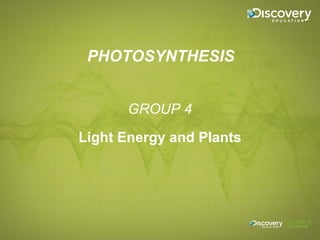Group 4 photosyntheis Presentation-MSP
- 1. PHOTOSYNTHESIS GROUP 4 Light Energy and Plants
- 2. Learning Objectives ŌĆó By the end of this lesson, students should be able to: -explain that the process of photosynthesis converts light energy to chemical energy. - explain that the sun is the original energy source for most life on earth. -identify the reactants and products of photosynthesis. -explain which reactions in photosynthesis are light dependent which are light independent. -explain why many plants appear green to us here on earth. Return to TOC
- 3. Presenters ’ü▒ John: Explain that the sun is the original energy source for most life on earth and the basics components needed for photosynthesis. Share short Discovery Education video on photosynthesis. ’ü▒ Monique: Explain that the process of photosynthesis converts light energy to chemical energy. Share the Nova Illuminating Photosynthesis resource. ’ü▒ Terence: Identify the reactants and products of photosynthesis, and explain which reactions in photosynthesis are light dependent which are light independent. Share the resource Teach Engineering. ’ü▒ Michelle: Explain why many plants appear green to us here on earth. Share the resource Biology 4 Kids. Return to TOC
- 4. What is the process of photosynthesis? ŌĆó Photosynthesis converts light energy into chemical energy. ŌĆó Photosynthesis provides the energy needed by most plants, animals, and other living things. Return to TOC
- 5. The Process of Photosynthesis Return to TOC
- 6. The Process of Photosynthesis The process of photosynthesis converts light energy to chemical energy. Return to TOC
- 7. Nova Illuminating Photosynthesis Return to TOC
- 8. Light Dependent and Independent Reactions in Photosynthesis Return to TOC
- 9. Light Dependent Reactions: Light Independent Reactions: The Calvin Cycle Light Dependent Reactions: Light Independent Reactions: The Calvin Cycle Light Dependent and Independent Reactions in Photosynthesis Return to TOC
- 10. Teach Engineering Return to TOC
- 11. Different wavelengths of visible light are seen by the human eye as different colors. WHYWHY AREARE PLAPLANTSNTS GREGREEN?EN? Gamma rays X-rays UV Infrare d Micro- waves Radio waves Visible light Wavelength (nm)
- 12. Why are plants green? Reflected light Transmitted light Sunlight minus absorbedSunlight minus absorbed wavelengths or colorswavelengths or colors equals the apparent color ofequals the apparent color of an object.an object.
- 13. ŌĆó The green color comes from chlorophyll in the chloroplasts ŌĆó Chloroplasts absorb light energy and convert it to chemical energy Light Reflected light Absorbed light Transmitted light Chloroplast THE COLOR OF LIGHT SEEN IS THE COLOR NOT ABSORBED
- 14. ŌĆó Photosynthesis is the process by which autotrophic organisms use light energy to make sugar and oxygen gas from carbon dioxide and water AN OVERVIEW OF PHOTOSYNTHESIS Carbon dioxide Water Glucose Oxygen gas PHOTOSYNTHESIS
- 15. Photosynthesis ŌĆó Occurs in chloroplasts ŌĆó The green color comes from chlorophyll in the chloroplasts ŌĆó Chlorophyll is the green pigment that captures light for photosynthesis ŌĆó The pigments absorb light energy and create sugar and oxygen
- 16. Biology 4 Kids Return to TOC
- 17. Resources and References ŌĆó Google Images of Photosynthesis ŌĆó Nova Illuminating Photosynthesis ŌĆó Teach Engineering ŌĆó Biology 4 Kids Return to TOC
- 18. Photosynthesis Quiz Return to TOC 1. The process of photosynthesis converts a. Nutrients into cell growth b. Cell mass into plant structure c. Light energy into chemical energy d. Plant cells into animal cells
- 19. Photosynthesis Quiz Return to TOC 2. The origin of energy for most life on earth is a. Carbon, oxygen, and water b. Natural light from the sun c. The EarthŌĆÖs core d. The atom
- 20. Photosynthesis Quiz Return to TOC 3. What are the reactants and products of photosynthesis? a. Oxygen and water; carbon dioxide and sugars b. Sugars and oxygen; water and carbon dioxide c. Carbon dioxide and water; sugar and oxygen
- 21. Photosynthesis Quiz Return to TOC 4. The process of photosynthesis is divided into two main parts. What is the order of the process? a. Light independent reaction and light dependent reaction b. Light dependent reaction and light independent reaction c. Both of the above d. None of the above
- 22. Photosynthesis Quiz Return to TOC 5. Plants appear green to the human eye due to a. Reflection of green light b. The processing of chloroplast c. Absorption of pure light d. The processing of chlorophyll






















